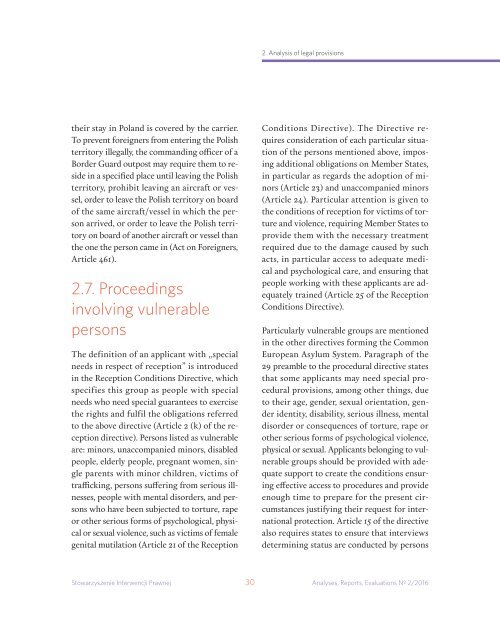At the border
at-the-border
at-the-border
Create successful ePaper yourself
Turn your PDF publications into a flip-book with our unique Google optimized e-Paper software.
2. Analysis of legal provisions<br />
<strong>the</strong>ir stay in Poland is covered by <strong>the</strong> carrier.<br />
To prevent foreigners from entering <strong>the</strong> Polish<br />
territory illegally, <strong>the</strong> commanding officer of a<br />
Border Guard outpost may require <strong>the</strong>m to reside<br />
in a specified place until leaving <strong>the</strong> Polish<br />
territory, prohibit leaving an aircraft or vessel,<br />
order to leave <strong>the</strong> Polish territory on board<br />
of <strong>the</strong> same aircraft/vessel in which <strong>the</strong> person<br />
arrived, or order to leave <strong>the</strong> Polish territory<br />
on board of ano<strong>the</strong>r aircraft or vessel than<br />
<strong>the</strong> one <strong>the</strong> person came in (Act on Foreigners,<br />
Article 461).<br />
2.7. Proceedings<br />
involving vulnerable<br />
persons<br />
The definition of an applicant with „special<br />
needs in respect of reception” is introduced<br />
in <strong>the</strong> Reception Conditions Directive, which<br />
specifies this group as people with special<br />
needs who need special guarantees to exercise<br />
<strong>the</strong> rights and fulfil <strong>the</strong> obligations referred<br />
to <strong>the</strong> above directive (Article 2 (k) of <strong>the</strong> reception<br />
directive). Persons listed as vulnerable<br />
are: minors, unaccompanied minors, disabled<br />
people, elderly people, pregnant women, single<br />
parents with minor children, victims of<br />
trafficking, persons suffering from serious illnesses,<br />
people with mental disorders, and persons<br />
who have been subjected to torture, rape<br />
or o<strong>the</strong>r serious forms of psychological, physical<br />
or sexual violence, such as victims of female<br />
genital mutilation (Article 21 of <strong>the</strong> Reception<br />
Conditions Directive). The Directive requires<br />
consideration of each particular situation<br />
of <strong>the</strong> persons mentioned above, imposing<br />
additional obligations on Member States,<br />
in particular as regards <strong>the</strong> adoption of minors<br />
(Article 23) and unaccompanied minors<br />
(Article 24). Particular attention is given to<br />
<strong>the</strong> conditions of reception for victims of torture<br />
and violence, requiring Member States to<br />
provide <strong>the</strong>m with <strong>the</strong> necessary treatment<br />
required due to <strong>the</strong> damage caused by such<br />
acts, in particular access to adequate medical<br />
and psychological care, and ensuring that<br />
people working with <strong>the</strong>se applicants are adequately<br />
trained (Article 25 of <strong>the</strong> Reception<br />
Conditions Directive).<br />
Particularly vulnerable groups are mentioned<br />
in <strong>the</strong> o<strong>the</strong>r directives forming <strong>the</strong> Common<br />
European Asylum System. Paragraph of <strong>the</strong><br />
29 preamble to <strong>the</strong> procedural directive states<br />
that some applicants may need special procedural<br />
provisions, among o<strong>the</strong>r things, due<br />
to <strong>the</strong>ir age, gender, sexual orientation, gender<br />
identity, disability, serious illness, mental<br />
disorder or consequences of torture, rape or<br />
o<strong>the</strong>r serious forms of psychological violence,<br />
physical or sexual. Applicants belonging to vulnerable<br />
groups should be provided with adequate<br />
support to create <strong>the</strong> conditions ensuring<br />
effective access to procedures and provide<br />
enough time to prepare for <strong>the</strong> present circumstances<br />
justifying <strong>the</strong>ir request for international<br />
protection. Article 15 of <strong>the</strong> directive<br />
also requires states to ensure that interviews<br />
determining status are conducted by persons<br />
Stowarzyszenie Interwencji Prawnej 30<br />
Analyses, Reports, Evaluations Nº 2/2016


